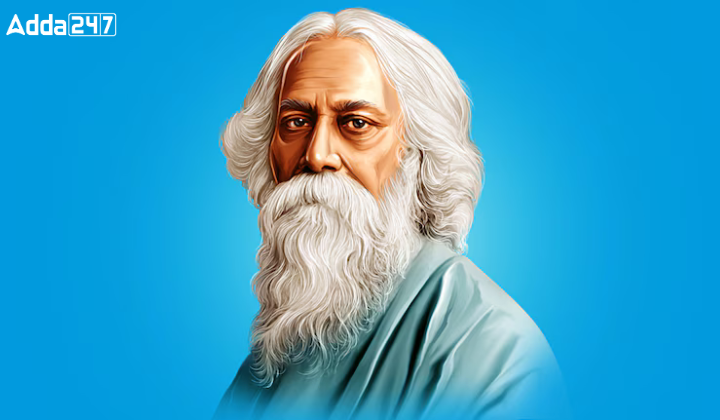Table of Contents
Rabindranath Tagore Jayanti 2024
Rabindranath Tagore Jayanti, also known as Rabindra Jayanti or Poncheeshe Boishakh in Kolkata, is a culturally significant occasion that celebrates the birth anniversary of the renowned Nobel laureate, Rabindranath Tagore. This literary genius has been bestowed with honorific titles such as ‘Gurudev’, ‘Kabiguru’, and ‘Biswakabi’, reflecting his immense contributions to the world of literature and beyond.
Widely revered across the globe, Tagore’s remarkable legacy extends beyond his literary works, encompassing music, art, social reform, and philosophical thought. Hailing from West Bengal, this legendary Bengali poet, writer, painter, and philosopher has profoundly influenced the cultural and political landscape of India.
As we commemorate Rabindranath Tagore’s 163rd birth anniversary, it is an opportune moment to delve deeper into the life and achievements of this multifaceted personality, who has left an indelible mark on the annals of history. This occasion serves as a reminder of Tagore’s enduring impact and the significance of preserving and celebrating the rich cultural heritage he has bequeathed to humanity.
Rabindranath Tagore Jayanti 2024: Date
According to the Gregorian calendar, Rabindranath Tagore was born in Kolkata on May 7, 1861, to Debendranath Tagore and Sarada Deviwas. He was a prominent figure from Bengal whose influence on Bengali literature, music, and Indian art was profound through modernism.
In West Bengal, Rabindra Jayanti is typically observed on the 25th day of the Bengali month of Boishakh, as per the traditional Bengali calendar. In 2024, we will mark the 163rd birth anniversary of Rabindranath Tagore on Wednesday, 8th May.
Important Days in May 2024: List of National & International Days
Rabindranath Tagore Jayanti 2024: History
Rabindranath Tagore was born on May 7, 1861, in Calcutta, now known as Kolkata. He was affectionately referred to by various names such as ‘Gurudev’, ‘Kabiguru’, ‘Biswakabi’, and ‘Bard of Bengal’. Tagore, a Bengali poet, novelist, and painter, played a significant role in acquainting the West with Indian culture.
A polymath, Tagore greatly influenced the literature and music of the region. He shared a close bond with Mahatma Gandhi, bestowing upon him the title of Mahatma. Tagore advocated for national integration in India through the principle of unity in diversity. Tagore delivered speeches at the World Parliament for Religions in 1929 and 1937. He passed away on August 7, 1941, in Calcutta.
Rabindranath Tagore, despite being non-European, achieved a historic milestone by receiving the Nobel Prize in Literature in 1913 for his collection of poems, including “Gitanjali,” earning him the title of Bard of Bengal. His recognition was considered a major lifetime achievement. Tagore’s contributions extended beyond literature; he was also a notable musician and artist. He created nearly 3000 paintings and composed approximately 2230 songs. Tagore’s significance transcended borders as he authored the national anthems of Bangladesh, Sri Lanka, and India. Additionally, he founded Viswa Bharti University, originally named Shantiniketan.
Rabindranath Tagore’s Contributions
- Rabindranath Tagore, renowned for composing over 2000 songs known as ‘Rabindra Sangeet,’ characterized by their unique lyrical and flowing style.
- He played a pivotal role in modernizing Bengali prose and poetry, with notable works including Gitanjali, Ghare-Baire, Kabuliwala, Gora, Manasi, Balaka, and Sonar Tori.
- Initiating his poetic journey at the age of eight, Tagore published his first poems at 16 under the pseudonym ‘Bhanusimha.’
- His composition ‘Ekla Chalo Re’ remains a memorable contribution.
- Tagore’s influence extended beyond India and Bangladesh; he inspired a Ceylonese student to create Sri Lanka’s national anthem.
- In 1901, Tagore established Brahmacharya Ashram, a school in Santiniketan, with five students, including his eldest son, and five teachers.
- He later transformed it into Vishwa-Bharati University in 1921, challenging conventional education.
- Aside from his literary endeavors, Tagore was a philosopher, exploring various subjects such as politics, education, and spirituality.
- His philosophical works encompass titles like “Sadhana: The Realization of Life,” “The Religion of Man,” and “Nationalism.”
Rabindranath Tagore Jayanti 2024: Significance
Rabindranath Tagore, a celebrated poet hailing from Bengal, was born on May 7, 1861, in Jorasanko Thakurbai, Kolkata. His profound contributions to art and literature earned him the title of ‘The Bard of Bengal,’ while his admirers affectionately referred to him as ‘Gurudev.’ Tagore’s seminal work, ‘Geetanjali,’ earned him the Nobel Prize in 1913.
Tagore, known for his prowess in both poetry and art, penned approximately 2230 songs and created nearly 3000 paintings during his lifetime. He is also credited with composing the national anthems of India, Sri Lanka, and Bangladesh. Additionally, Tagore established Viswa Bharti University in West Bengal, formerly known as Shantiniketan.




 GA Capsule for SBI Clerk Mains 2025, Dow...
GA Capsule for SBI Clerk Mains 2025, Dow...
 The Hindu Review October 2022: Download ...
The Hindu Review October 2022: Download ...
 Seating Arrangement Questions for IBPS R...
Seating Arrangement Questions for IBPS R...


